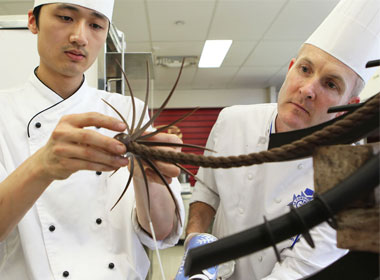-
Locations
Campuses in EuropeCampuses in The AmericasCampuses in AsiaLe Cordon Bleu International
- Online Learning
Contact your local representative - Our Story
- Programmes
- Brochures
- News & Events
- Contact
- Find Course

Name: Andre Sandison
What course do you teach? Pâtisserie
Institution: Le Cordon Bleu Culinary Arts Institute Sydney
Chef Andre’s experience includes working in restaurants, casinos, hotels, pâtisserie production facilities, and now teaching. He has lived and worked in Japan, the United Kingdom, Switzerland and Australia. He has recently been team captain for Team Pastry Australia which won the Asian Pastry Cup in Singapore in 2012.
Q. What qualifications route did you take to realise your career?
I did an apprenticeship in Australia after discovering an interest in the profession. What I loved most was learning on the job and the release one day a week to learn in TAFE.
Q. Please explain what students will learn during your course
Students learn the foundation in classic French pâtisserie. As they progress through the course, they build on that foundation to develop and refine their patisserie skills and enhance presentation. All this is underpinned by practising good hygiene and developing time management skills, so critical in a kitchen.
Q. What’s the first thing you teach your students?
Safety, hygiene, teamwork and foundation skills to operate productively in a professional kitchen.
Q. What qualities do you need to succeed in your industry?
Passion. You have to love this profession, love working with your hands, love to serve others when family and friends are enjoying themselves. Becoming a chef is so much more than just cooking. You need to be organised, able to motivate others, lead by example, think on your feet. You need to be creative and develop all your senses from a gastronomic point of view. In pâtisserie, you also need a good understanding of food science and ratios, architecture and aesthetic.
Q. What are the benefits of studying your subject?
You learn a solid foundation in classic culinary skills and knowledge that will be a great start to your career.
Q. Explain why you love your subject.
I love to work with my head as well as my hands, I love to serve others, I love food and the endless discovery that food brings. The profession is always evolving and I am constantly learning and inspired by both colleagues and students alike.
Q. What skills do your students have by the end of the course?
They will have foundation skills to produce pâtisserie in a range of contexts from plated desserts, confectionery, gateaux, breads and pastries, as well as afternoon tea items.
Q. What do students normally do once they’ve finished their course?
As our program is an intensive study program, industry experience is the first port of call for all graduates. The skills sets need to be contextualised to the different industry scenarios available.
Q. What’s the best way to go about getting a job in your industry?
Be organised with a good resume, be on time for appointments, be polite and persevere with all opportunities offered. Remember that you can learn something from any industry experience.
Q. Can you describe a typical day in your working life?
Before I became a lecturer, there would be constant deadlines through the day and throughout the week, it was a cycle of backwards planning. This meant that production was planned in reverse to ensure all mise en place was organised on time and the food orders and rosters planned accordingly. Product development and seasonal planning would evolve out of the experiences around you. I think this is why chefs love recipe books so much.
Q. What advice do you have for people interested in studying a course like yours?
Upon graduating, remember, you are only just starting your career. Make it a 10 year plan to achieve ‘overnight success’. You will not use every skill set you learn upon graduation, that will come as you build your career. Over time, your career will open many doors, to many great and talented people, across many countries and cultures.
Copyright © 2024 Le Cordon Bleu International B.V. All Rights Reserved.